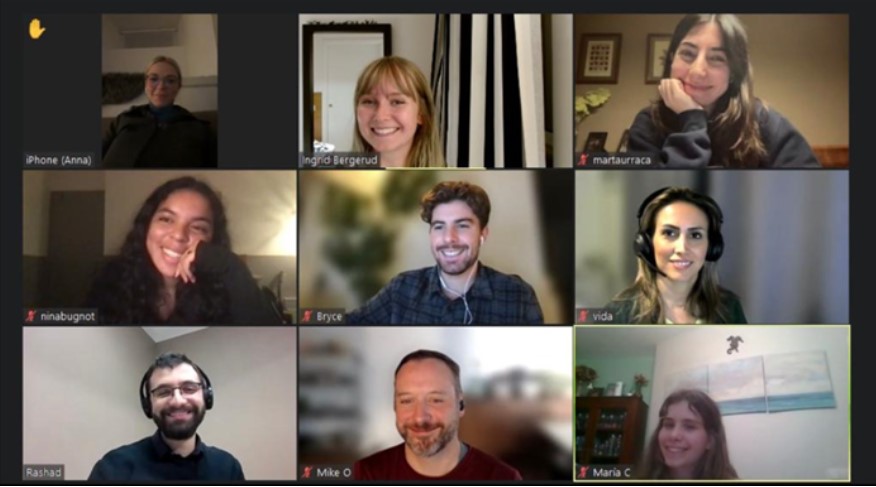Is English Language Spoken In Norway?
You might have heard that Scandinavian countries have a high proficiency in English. Just how true is this? Is English really spoken in Norway? And just how much English does the average Norwegian speak? Let’s find out!

Key takeaways
- Most Norwegians speak English fluently
- Major cities have a higher proficiency in English than rural areas
- English is not an official language in Norway
- Norwegian can speak English, but are more comfortable speaking Norwegian.
- Knowing English is a must for many careers in Norway
- Norwegians are immersed in English from an early age
- There are many linguistic similarities between Norwegian and English.
Is the English Language Spoken In Norway?
English is not an official language in Norway, but you might think it is based on how many people speak it. Travelling to the major cities of Norway, you’ll find that most people speak English fluently. In fact, 90% of Norwegians can say that they speak English.
The amount of English speakers vary depending on where in Norway you find yourself. For instance, in big cities like Oslo, Bergen or Trondheim, you’ll find that most people you stop on the street will be able to converse in English without a problem. However, if you travel to more rural areas, English can still be understood, but it might be harder finding someone who is able to carry on a conversation with you problem free.
If we compare Norway’s English speaking proficiency with the rest of Europe, we find only two countries rating higher on the EF English Proficiency Index (Netherlands and Austria). Norway has a solid position in the “Very High Proficiency” bracket of this group, rating higher than our neighbouring countries of Sweden and Denmark. In fact, most of Europe don’t qualify for this grouping, either landing themselves in the “High Proficiency” group or lower.
So it’s a safe bet that travelling to Norway as an English speaker will not cause you many problems, at least not when it comes to communication.
So why is English proficiency so high in Norway? We’ll, for starters, Norwegian and English are both Germanic languages. This means that they have a common ancestor way back. So the vocabulary, grammar, and syntax all come from the same place. Over centuries of linguistic evolution, the ancient Germanic language developed into multiple different languages, but there are still plenty of similarities today. You’ll find a similar sentence structure, vocabulary and grammatical rules. So learning English as a Norwegian is far easier than learning another language with different roots.
On top of this, Norwegian school kids are taught English from a very young age. Add to this the fact that we don’t dub movies or TV, the prevalence of American/English music, and the overall high amount of English speaking content we consume from an early age, English is a language we are immersed in from an early age.
The Status Of English In Norway
While it is widely spoken, English is still a foreign language in Norway. Norwegians grow up speaking Norwegian, and speak it for most of their everyday life. So while you can converse with just about anyone in English, it will still be their second language.
The Norwegian government does not recognize English as one of its three main languages (Norwegian bokmål, Norwegian nynorsk, and Sami). Even so, you might think it might as well be. According to the EF English Proficiency Index, Norway lands at a respectable number four in the global rankings of English proficiency, only being beaten by the Netherlands, Singapore and Austria.
With this in mind, you might ask yourself, “Can I live in Norway only speaking English?”.
The answer to this, for the most part, is yes. Most people you’ll meet, especially the younger generations, all speak English close to fluently. So you can get by both socially and professionally with English. But it is worth noting that most Norwegians are more comfortable speaking Norwegian, so learning the language will definitely help you achieve deeper and more meaningful relationships, both in your personal life and your work life.
Learn fluent Norwegian in 4 months. Start today.
Did you know that you don’t need all the grammar to speak fluent Norwegian? In our classes we focus just on the necessary vocabulary. So you can learn 3 times faster.
How do Norwegians learn English?
With the high level of English proficiency found in Norway, you can ask how the country has achieved this. English is taught from the start of a child’s scholastic career and all the way through high school (depending on the high school curriculum). The government places a great deal of focus on the English language subject, as it is seen as an essential language for Norwegians to know.
From the 1st. to the 7th grade, otherwise known as Barneskolen (Grade school), the official curriculum mandates at least 1 hour of English per school week. This number increases to 2 hours per week from 8th through 10th grade, known as Ungdomsskolen (Grade school).
When a student reaches high school in Norway, they begin to choose the direction they want to take their education. So if a child dreams of being an electrician, they may not require any additional English lessons in school. But, generally, we can say that students receive 1 hour of English per school week during the last three years of their high school years.
All in all, this means that from the age of 6, children in Norway are exposed to the English language on a weekly basis. This is not that different from other countries, where English is also taught in school, but given Norwegian’s common roots with English (they are both Germanic languages), and the fact that Norwegians are deeply immersed in the English language through music, TV, Movies, Video Games, Podcasts etc. there is plenty of extramural English going on outside the classroom.
But things are not all peaches and cream though. Plenty of criticism has been lobbied towards the English educational practices in Norway. They range widely from not having high enough ambitions for their students, too little focus on speaking English and too much on writing, and teachers not having strong enough credentials to teach the language.
As it stands though, many Norwegians will say that though they learned plenty of English in school, their main teacher was the content they consumed outside of school.
Reasons To Have English Proficiency Level In Norway
If English is not an official language in Norway, are there any benefits of being able to speak English with a high proficiency as a Norwegian, besides being able to help give tourists directions? As a matter of fact, yes! They boil down to career benefits and cultural influence. Let’s take a look.
Career Benefits
Norway is a small country. Because of that, we have to do business with many international partners. We can’t expect them to speak Norwegian, so it’s on us to learn English.
If you want your business to grow you’ll need English. Therefore, many companies require their employees to be able to speak English, even if you won’t speak it during your day to day working life.
But when the big meeting with the Japanese partners does occur, it’s a safe bet English will be spoken. And as a valued employee, it will be your duty to step up.
Cultural Influence
Movies, TV-shows, video games etc. are not dubbed in Norwegian for us. And although we have a film industry and plenty of fun and interesting shows to watch in Norwegian, if we want to take part in international culture, we need to understand English.
This benefits the Norwegian population though. Children’s movies and programs are dubbed in Norwegian, but as soon as we start consuming content not aimed at young children, Norwegians are immersed in English. In this way we learn English without going to school or having to study.
Knowing English also helps us with tourism. Norway has plenty to offer tourists, and many people visit us all throughout the year. Knowing English is key for anyone working in the tourism industry. Additionally, when Norwegians travel abroad, we can’t expect other nationalities to understand Norwegian, so English is often the common denominator here.
Learn fluent Norwegian from your level
Check your level now, and find the right course for you
Our classes has native Norwegians who knows how it feels to learn a language, and will do everything to help you.
What are the linguistic features of Norwegian English?
Alright, so we’ve established that Norwegian and Norwegian are close when it comes to their linguistic features. But it’s not like you can intuitively understand Norwegian just by speaking English right? So just how close are they? Let’s take a look at pronunciation, grammar and vocabulary to answer this question.
If you’re looking for a nice and effective way to learn Norwegian, you can check out our online conversation classes, that will make you fluent in no time at all!

Pronunciation
When it comes to pronunciation, there are some differences between English and Norwegian you will have to overcome if you’re a new learner. For starters we have three extra letters in Norwegian.
- Æ (pronounced like the A sound in the word ask in American English)
- Ø (pronounced like the U sound in the word Burn in American English)
- Å (Pronounced like the O sound in the word Score in American English)
Though we can make some approximations, the vowel sounds created by these, and several other letters, do not match completely with English. So learning and getting comfortable with the alphabet is key for any new Norwegian learner.
Grammar
Taking a look at grammar, we see that both languages share some similarities. Both are SVO languages, meaning the subject (S) usually comes first in a sentence, followed by the verb (V) and then the object (O). Many variables affect this word order, or syntax, but generally speaking this is how sentences in both languages are structured.
Norwegian however varies a lot depending on a bunch of different factors. So you can’t assume the structure of an English sentence will be translatable to Norwegian word for word.
Another notable difference in grammar are then nouns of genders. In English, nouns have genders, whereas Norwegian has three! Masculine, feminine and neutral. Each of these genders bring with them different articles, that will be new for English speakers who just say the or a/an in front of any noun.
Vocabulary
Lastly, vocabulary. Both languages are Germanic languages. Because of this, they share plenty of cognates, or words with similar roots. So, there are many Norwegian words that look and sound like English ones. While there are more that do not, you’ll get a lot of freebies because of the languages’ shared roots in ancient Germanic.
Additionally, since Norway is so immersed in English speaking culture, we have a lot of loanwords from English that we have Norwegianized. Here are just a few that Norwegians use in everyday life.
- Shopping
- Matche (when using dating apps)
- Joine (to join)
- Party
- Weekend
There are plenty more, and many Norwegians make their own rules as to which English words they want to incorporate in their vocabulary. And, since most Norwegians speak English, they won’t skip a beat when hearing English mixed with Norwegian.
English Use In Major Cities In Norway
Looking at the major cities of Norway, we turn our gaze to Oslo and Bergen. Just how common is the use of English in these cities?
Do People Speak English In Oslo?
Yes! For the most part, people in Oslo speak English here. 9 out of 10 people will be perfectly able to converse in English. It is also a popular tourist destination, so you will find the major tourist attractions highly accessible.
You can also check out visitoslo.com for an English guide on things to do and see in Oslo.
Do People Speak English In Bergen?

Just like Oslo, Bergen is a popular tourist destination. It offers a bit more classical Norwegian architecture and culture, whereas Oslo is more modern.
Even so, English is a must in this city for both the residents and the businesses. So you can get by just fine with English here too. Check out this site for what to do in Bergen.
Tired of scrolling through the internet for Norwegian grammar?
Start an organised Norwegian course now.
In order to learn fluent Norwegian, we need to repeat it and speak it several times before our brain learns it.
Learn that in our courses!
Frequently Asked Questions About Is English Language Spoken In Norway
Is the English Language Spoken In Norway?
Yes, English, while not an official language in Norway, is spoken by most people. The major cities have a higher degree of English proficiency though. And travelling to more rural areas might make only speaking English more difficult.
Do People Speak English In Oslo?
Yes. Almost everyone in Oslo speaks English as a second language. Proficiency is higher for the younger generations.
Learn fluent Norwegian in 4 months. Start today.
Did you know that you don’t need all the grammar to speak fluent Norwegian? In our classes we focus just on the necessary vocabulary. So you can learn 3 times faster.
